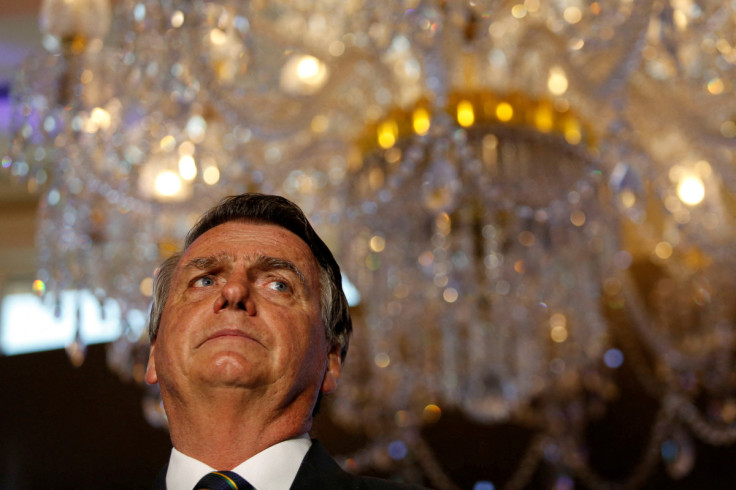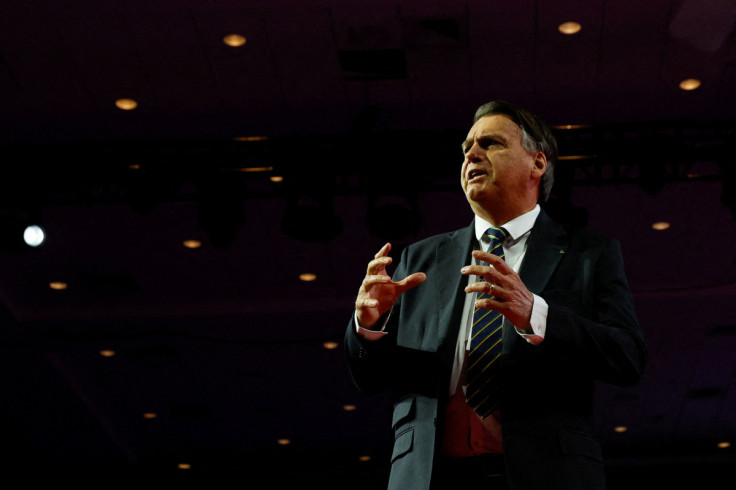What Next For Bolsonaro? Not The Presidency, Wager Even His Brazil Allies

Former President Jair Bolsonaro promises to be many things in the coming years: a leader of Brazil's political opposition, a thorn in the side of leftist President Luiz Inacio Lula da Silva, and a kingmaker in right-wing politics.
But a presidential candidate? Not even Bolsonaro's most powerful allies are banking on that.
The ex-president is facing more than a dozen cases in electoral court due to his conduct in last year's campaign, when he repeatedly attacked the legitimacy of Brazil's electronic voting system while running for re-election.
Legal experts and two senior judiciary sources told Reuters they expect him to lose at least one of those cases, which would bar him from running in the 2026 presidential campaign.
Even Bolsonaro's ex-chief of staff is floating alternatives, counting on his former boss to help from the wings.
"Any ticket with the backing of an ineligible Bolsonaro would easily win the election," said Senator Ciro Nogueira, who runs the conservative Popular Party, in a Reuters interview.
Bolsonaro's electoral outlook contrasts sharply with former U.S. President Donald Trump, another right-wing populist who challenged the results of his failed re-election campaign.
Despite criminal charges brought against Trump last week over a hush-money payment that prosecutors allege was to benefit his 2016 campaign, he remains the favorite in betting markets to be the Republican nominee in next year's U.S. presidential election.
While Bolsonaro may also face jeopardy in roughly a half dozen criminal probes, a decision sealing his political fate is more likely to come from the Superior Electoral Tribunal (TSE), the most senior body in Brazil's unique electoral court system.
The fastest-moving TSE case against Bolsonaro centers on a briefing he held for the diplomatic corps in Brasilia in July, while president, charging the election system was open to fraud in remarks broadcast live on government TV and social media.
"If it is not this case, it will be the next one," said Henrique Neves, a former electoral court judge, when asked about the likelihood of TSE declaring Bolsonaro ineligible for office.
Bolsonaro never conceded his narrow defeat in the October election and continues to question the reliability of Brazil's voting system. The TSE rejected his formal complaint challenging the electoral result and fined his party more than $4 million for what the court called bad faith litigation.
The chairman of his right-wing Liberal Party, Valdemar Costa Neto, who is paying for Bolsonaro's defense, declined to comment on the case and said Bolsonaro should be allowed to run because he committed no crime.
Last month at an event with supporters in Florida, Bolsonaro himself said he expected to be declared ineligible, although he argued that speaking to diplomats was his prerogative as president.
Despite the challenges, Bolsonaro's return to Brazil in late March after three months in the United States showed he is eager to remain a political protagonist. With three sons in elected office and tens of millions of followers on social media, there is little doubt his conservative movement will carry on.
And legal setbacks in Brazil are not always set in stone.
Lula himself was barred from running for president in 2018 due to a bribery conviction that was thrown out by the Supreme Court in time for him to win last year's election.
RISING CONSERVATIVE STARS
Still, conservative powerbrokers allied with Bolsonaro are ready to reshuffle the deck for the next election cycle.
Senator Nogueira said several right-wing leaders who emerged on Bolsonaro's coattails could run for president, in contrast to the Workers Party, which has few obvious heirs to Lula.
Nogueira cited rising stars on the right such as Sao Paulo Governor Tarcisio Freitas, Minas Gerais Governor Romeu Zema, and former Agriculture Minister Tereza Cristina.
Freitas was a minister under Bolsonaro and now runs Brazil's richest and most populous state, traditionally a stepping stone to the presidency, although he is still in his first term. Zema is called a "closet Bolsonarista" because he has kept a political distance from Bolsonaro that could help him rally center-right moderates - but is not well-known outside Minas Gerais.
Bolsonaro's wife, Michelle Bolsonaro, would be "a great candidate for vice president," said Nogueira.
Costa Neto said the first test of the former president's lasting political influence will come when he stumps for allies in next year's municipal elections.
But, with or without Bolsonaro, Costa Neto said he was confident of a right-wing comeback in 2026. He said a TSE decision to bar Bolsonaro from running would only boost the ex-president's political appeal. Any right-wing substitute could win with his endorsement, he added, while side-stepping the high rejection rates Bolsonaro faced as a candidate last year.
"There are good reasons to believe a right-wing candidacy can win in 2026," said Mario Sergio Lima, senior Brazil analyst at Medley Global Advisors, citing questions about the economy and the lack of an heir apparent for Lula, 77.
But Lima was skeptical of Bolsonaro's personal influence.
"He will most likely be stripped of his political rights, and without them he will find it very hard to lead any sort of right-wing project," he said. "Candidates like Tarcisio or Zema would try to distance themselves from him to draw moderates."

© Copyright Thomson Reuters 2024. All rights reserved.











